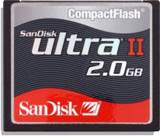Say Good-bye to Hard Disk Drives
I didn’t make any predictions on New Years Day because I was traveling so instead maybe I’ll make predictions all year long. Today’s prediction is that by 2010 “personal” computers will no longer have “hard disks”.
Replacing hard drives will be non-volatile memory commonly called “Flash memory”. It’s also called a “Solid State Disk” although there is no disc platter involved.
If you’ve been a digital camera user you’ve seen the price of memory like compact flash and Secure Digital cards plummet while the size capabilities have exploded. SanDisk has a 2 GB CompactFlash for $49.99.
Currently, you can put the entire Linux OS on a USB Flash keychain.
According to our friends at Engadget, A-Data is now making a 128GB SSD with a SATA Interface. That’s three times the minimum requirement for even Windows Vista!
While I may not be ready to replace my current 500GB Raid0 SATA drive, it’s only a matter of time before SSD will catch up with the four critical factors.
Size
Price
Speed
Reliability
Speed will soon surpass mechanical drives and with no moving parts reliability is close behind. Once the price per byte comes down we’ll see a mini rack of removable Solid State Drives on the front every computer sold. I’m looking forward to it if only to make organization of my files easier to handle.
Next year I’ll continue my prediction discussing how every user will have their own personal SSD that they can plug into a computer and reboot to their user profile. After that we’ll be reading about software licenses that include text like “This version of Google Photoshop may be installed on up to 3 personal SSD chips” before digital rights management control kicks in.
 Bits from Bill
Bits from Bill


3 Comments:
I hope that you are aware that the 500 Gig hard drives are not very reliable (because they push the technology to the limit) and can only function because of the error correction codes (meaning that they are constantly doing recovery). And the solid state disks also have their problems: limited write cycles which wouldn't be such a big problem, except none of the widely deployed file systems (FAT, NTFS, EXT3, etc) take this into account. On Windows it is even worse, because it wants to do the safe thing and doesn't buffer writes to USB disks, so every read and write goes directly to it. Having this in mind I wouldn't use any of these solutions for storage. My next step to extend my storage space for example will be to buy two 250 - 300 Gig HDs.
cdman83 -> I am very interested in your comments about "500 Gig hard drives are not very reliable" Is there any research to back that up? You dont mention a manufacturer, I have found that Seagate is extremely reliable, as I normally install about a hundred a year for our clients.
Regarding the SSD drives, I thought the limited write was not an issue at all, one not even worth mentioning now since nand technology has surpassed regular hard drives in mtbf.
I highly recommend using raid of some sort if you are concerned about reliability. I am still a firm believer in SCSI, but if funds are limited a good raid 5 with even ide or sata config means no data loss if a hard drive fails, by using a hot spare you can get away with more failures. For the ultimate security of course raid 1 is the best, and remember raid 0 is not raid no matter what anyone tries to tell you. I usually install Raid 10, I feel the speed is fantastic, and the reliability is extremely high. My raid system on this machine is 10 seagate sata 200 gig drives in a raid 5. I was thinking about updating it to the 500 or 750 gig drives though.
Yea, truthfully, I'm not a fan of Raid0. Recovery is a nightmare but I have a pretty good backup system in place so I enjoy the speed.
Bill is correct, the limited write capabilities of SSD will no longer be an issue.
I stand by my prediction and add that SSD will be one of the benefits of all the investment currently being done in the nanotechnology sector.
Post a Comment
<< Home